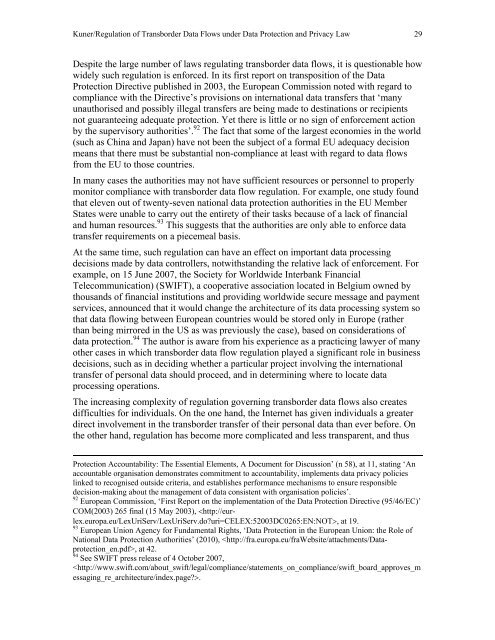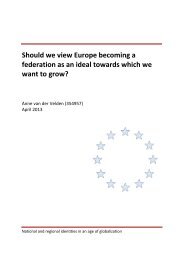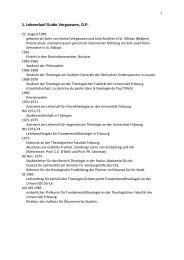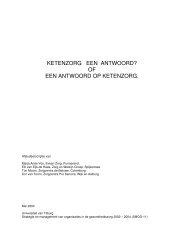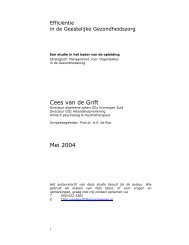Regulation of Transborder Data Flows under ... - Tilburg University
Regulation of Transborder Data Flows under ... - Tilburg University
Regulation of Transborder Data Flows under ... - Tilburg University
You also want an ePaper? Increase the reach of your titles
YUMPU automatically turns print PDFs into web optimized ePapers that Google loves.
Kuner/<strong>Regulation</strong> <strong>of</strong> <strong>Transborder</strong> <strong>Data</strong> <strong>Flows</strong> <strong>under</strong> <strong>Data</strong> Protection and Privacy Law 29<br />
Despite the large number <strong>of</strong> laws regulating transborder data flows, it is questionable how<br />
widely such regulation is enforced. In its first report on transposition <strong>of</strong> the <strong>Data</strong><br />
Protection Directive published in 2003, the European Commission noted with regard to<br />
compliance with the Directive’s provisions on international data transfers that ‘many<br />
unauthorised and possibly illegal transfers are being made to destinations or recipients<br />
not guaranteeing adequate protection. Yet there is little or no sign <strong>of</strong> enforcement action<br />
by the supervisory authorities’. 92 The fact that some <strong>of</strong> the largest economies in the world<br />
(such as China and Japan) have not been the subject <strong>of</strong> a formal EU adequacy decision<br />
means that there must be substantial non-compliance at least with regard to data flows<br />
from the EU to those countries.<br />
In many cases the authorities may not have sufficient resources or personnel to properly<br />
monitor compliance with transborder data flow regulation. For example, one study found<br />
that eleven out <strong>of</strong> twenty-seven national data protection authorities in the EU Member<br />
States were unable to carry out the entirety <strong>of</strong> their tasks because <strong>of</strong> a lack <strong>of</strong> financial<br />
and human resources. 93 This suggests that the authorities are only able to enforce data<br />
transfer requirements on a piecemeal basis.<br />
At the same time, such regulation can have an effect on important data processing<br />
decisions made by data controllers, notwithstanding the relative lack <strong>of</strong> enforcement. For<br />
example, on 15 June 2007, the Society for Worldwide Interbank Financial<br />
Telecommunication) (SWIFT), a cooperative association located in Belgium owned by<br />
thousands <strong>of</strong> financial institutions and providing worldwide secure message and payment<br />
services, announced that it would change the architecture <strong>of</strong> its data processing system so<br />
that data flowing between European countries would be stored only in Europe (rather<br />
than being mirrored in the US as was previously the case), based on considerations <strong>of</strong><br />
data protection. 94 The author is aware from his experience as a practicing lawyer <strong>of</strong> many<br />
other cases in which transborder data flow regulation played a significant role in business<br />
decisions, such as in deciding whether a particular project involving the international<br />
transfer <strong>of</strong> personal data should proceed, and in determining where to locate data<br />
processing operations.<br />
The increasing complexity <strong>of</strong> regulation governing transborder data flows also creates<br />
difficulties for individuals. On the one hand, the Internet has given individuals a greater<br />
direct involvement in the transborder transfer <strong>of</strong> their personal data than ever before. On<br />
the other hand, regulation has become more complicated and less transparent, and thus<br />
Protection Accountability: The Essential Elements, A Document for Discussion’ (n 58), at 11, stating ‘An<br />
accountable organisation demonstrates commitment to accountability, implements data privacy policies<br />
linked to recognised outside criteria, and establishes performance mechanisms to ensure responsible<br />
decision-making about the management <strong>of</strong> data consistent with organisation policies’.<br />
92<br />
European Commission, ‘First Report on the implementation <strong>of</strong> the <strong>Data</strong> Protection Directive (95/46/EC)’<br />
COM(2003) 265 final (15 May 2003), ,<br />
at 19.<br />
93<br />
European Union Agency for Fundamental Rights, ‘<strong>Data</strong> Protection in the European Union: the Role <strong>of</strong><br />
National <strong>Data</strong> Protection Authorities’ (2010), ,<br />
at 42.<br />
94<br />
See SWIFT press release <strong>of</strong> 4 October 2007,<br />
.


